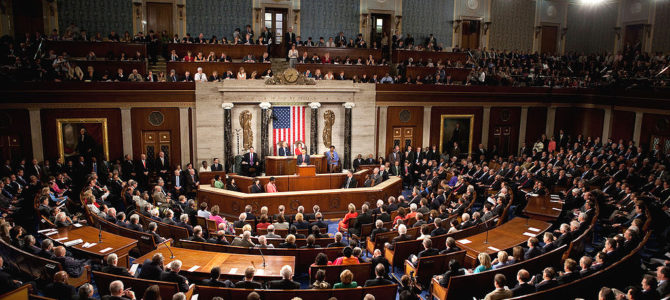
On this website last week, conservative leaders Sen. Mike Lee (R-UT) and Rep. Jim Jordan (R-OH) wrote a joint op-ed echoing my column from a few weeks previously, saying Congress remains on course for yet another omnibus spending bill debacle unless and until it reforms its procedures, and specifically starts considering, and passing, spending bills one-by-one, rather than in a catch-all bill enacted in a lame-duck session after the November elections.
All that sounds logical enough, at least to most individuals outside the Beltway. Why shouldn’t Congress do its job, and consider bills in a deliberative fashion, rather than jamming an entire year’s work into one must-pass vehicle totaling thousands of pages—a literal and figurative “Christmas tree” that usually passes in the waning days of December?
One example from 2015, in which the entire federal appropriations process broke down over the Confederate flag, explains the problem in a nutshell. If you want to know why the common-sense ideas Lee and Jordan proposed have little chance of coming to fruition any time soon, look no further.
Reason 1: Members of Congress Are Lazy
I don’t mean “lazy” in the sense of goofing around. Most members work long hours, including difficult commutes back and forth to their districts every week. I mean “lazy” in the sense of not wanting to vote on difficult or politically controversial issues. In 2015, the House halted its consideration of appropriations bills because Republican leaders “worried that Democrats could try to offer more amendments related to the display of the Confederate flag that could again tie the GOP into knots.”
In Congress, appropriations bills generally operate under free-wheeling procedures, in which members can offer germane (i.e., relevant) amendments. Because the appropriations bills collectively cover all federal operations, and because members have few opportunities to offer amendments to other bills in both the House and the Senate, the spending bills become magnets for every conceivable controversy.
Consider some amendments that might get offered this year were Congress to consider spending bills individually:
- Conservatives, particularly in the House, could seek to reduce or even eliminate funding for Special Counsel Robert Mueller’s investigation—amendments that moderate Republicans, or even Republican leaders, might oppose.
- A bipartisan coalition would again offer amendments regarding medical marijuana—amendments that the chairman of the House Rules Committee, Pete Sessions (R-TX), has largely prevented from being considered on the House floor.
- Democrats could offer political messaging amendments on issues ranging from President Trump’s tax returns to cabinet officers’ travel-related controversies to the emoluments clause—all issues that moderate Republicans, or Republicans with tough re-election campaigns, would not want to vote on prior to the midterm elections.
Therein lies the problem. Every controversial amendment vote becomes a potential 30-second attack ad. For instance, the 2010 ad attacking Sen. Harry Reid (D-NV) for voting against an amendment to prohibit federal funding of Viagra for sex offenders. That vote came as part of a budget bill amending Obamacare rather than an appropriations measure, but it illustrates the dilemma members, and congressional leaders, face.
Members of Congress have become so accustomed to avoiding votes on tough issues that many recoil at the thought of reinstituting an open process. They may not say so outright, but many would prefer that leadership make the tough decisions for them behind closed doors, rather than forcing them into votes that could undermine their re-election prospects.
Reason 2: Members Want to Rig Outcomes
The Confederate flag flap also illustrated this dilemma for congressional leaders: “Some Republicans, primarily representing Southern states, found out about the amendment [banning display of the Confederate flag] after the fact and threatened to vote against the entire bill if it remained intact.” In other words, because some members did not achieve an outcome they wanted on the specific amendment, they were willing to take down the entire measure.
As I noted last fall, the House Freedom Caucus, which Jordan helped to found, has engaged in these kinds of tactics. Last summer, after moderate Republicans and Democrats combined to defeat an amendment prohibiting the use of taxpayer funds for soldiers’ gender-reassignment surgery, conservatives went to congressional leaders and told them to insert the amendment in a spending bill, the prior vote notwithstanding.
That move, and others like it, represent a tactical mistake—one in which conservatives could win a battle while losing a larger war. Every time conservatives ask leadership to jerry-rig the process in favor of a conservative outcome, they empower leadership to jerry-rig a process against conservatives on things like passing 2,232-page bills mere hours after their public release.
As the old saying goes, the true test of a principle comes not when that principle proves convenient, but when it proves inconvenient. Only when members find themselves willing to take tough votes, and to abide by the outcome of those votes, even if it results in policy outcomes they disfavor, will the process become more open and transparent.
As I noted a few weeks ago, members already have the power to bring about that open and transparent process—the only question is if they have the wherewithal to use it.







